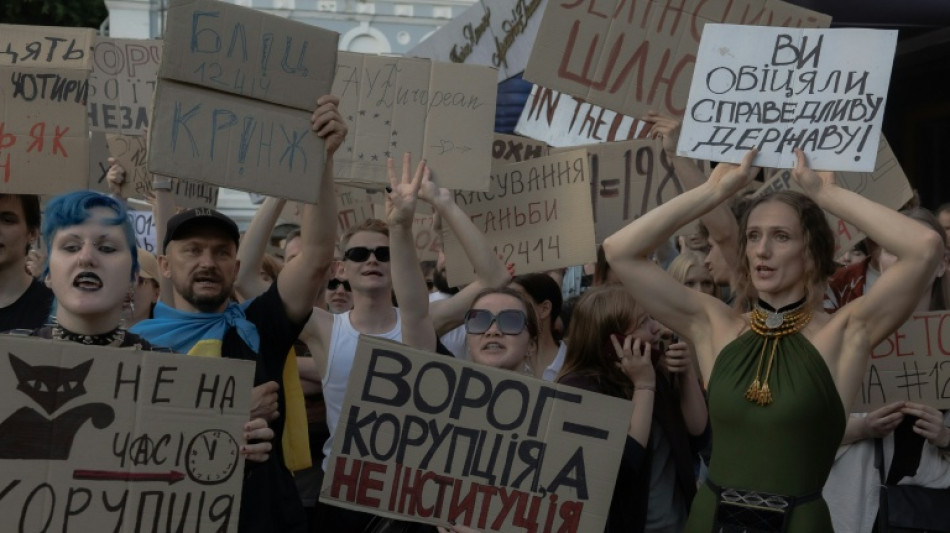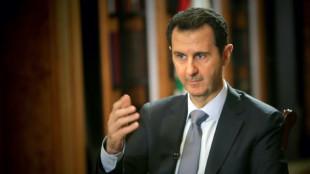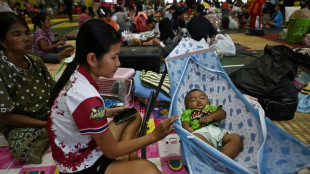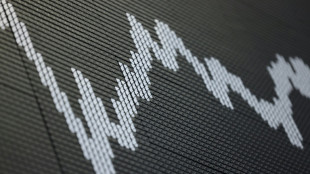
| JRI | -0.46% | 13.15 | $ | |
| RYCEF | -1.96% | 13.24 | $ | |
| BCC | -2.22% | 86.43 | $ | |
| SCS | -1.62% | 10.51 | $ | |
| NGG | -0.58% | 72.23 | $ | |
| CMSC | 0% | 22.43 | $ | |
| RBGPF | 9.33% | 75 | $ | |
| RELX | 1.15% | 53.71 | $ | |
| SCU | 0% | 12.72 | $ | |
| CMSD | -0.18% | 22.85 | $ | |
| RIO | -1.24% | 63.83 | $ | |
| VOD | 1.91% | 11.52 | $ | |
| BCE | -0.7% | 24.43 | $ | |
| BTI | 0.48% | 52.62 | $ | |
| BP | -1.81% | 32.13 | $ | |
| AZN | 0.92% | 73.68 | $ | |
| GSK | 0.52% | 38.23 | $ |

'A free Ukraine': Kyiv protests law threatening anti-corruption bodies
At a rare protest in central Kyiv demonstrators rallied Wednesday against a law that curbs the power of anti-corruption agencies, warning the fight for Ukraine's democracy was taking place both on the battlefield and at home.
The legislation, removing the independence of two key anti-corruption bodies, sparked the first major protests in Ukraine since it began fighting off the Russian invasion over three years ago.
"Our struggle takes place on two fronts. Our main enemy is external, but we have an internal battle too," said protester Viacheslav Bykov.
"We don't want Ukraine to be part of Russia, we don't want a corrupt or authoritarian Ukraine. We want a free Ukraine," he added.
Several thousand demonstrators -- mostly young -- gathered outside a theatre in Kyiv, calling for a veto to the law passed by Ukraine's parliament on Tuesday.
The law places the National Anti-Corruption Bureau of Ukraine (NABU) and Specialised Anti-Corruption Prosecutor's Office (SAPO) under the direct authority of the prosecutor general, who is appointed by the president.
Critics say the legislation would facilitate presidential interference in corruption probes and threatens the independence of key institutions in Ukraine.
- 'Ukraine is Europe' -
Zelensky responded to the backlash on Wednesday evening, saying he would submit a new bill ensuring "all norms for the independence of anti-corruption institutions will be in place".
Kyiv's partners had reacted with alarm, including European Commission head Ursula von der Leyen, who the EU said demanded explanations from Zelensky over the change.
Civil society groups warn the bill is part of a broader pattern of pressure on anti-corruption activists and bodies.
Some European allies worry the moves will undermine anti-corruption reforms key to Ukraine's bid to join the European Union -- a fear shared by many protesting on Wednesday.
"We've worked for years to move closer to Europe... only to be thrown back 10 years in a single day," said protester Anya Kutsevol.
Ukraine's two anti-corruption bodies, NABU and SAPO, were born a decade ago in the wake of the 2014 Maidan revolution.
Those pro-European protests, centred on Kyiv's main square, also called Maidan, ousted a Kremlin-backed leader who scrapped a key partnership agreement with the EU.
The Kremlin, which refused to accept Ukraine's democratic turn toward Europe, then launched a first assault over Ukraine that led Moscow-backed separatists to occupy Crimea and parts of the eastern Donbas region.
"Ukraine is Europe," Kutsevol said, "we won't be returned to Russia. We'll keep fighting for Europe."
- 'Our turn' -
Some fear that a political crisis over the legislation could work in Russia's favour by undermining unity within the country, which is struggling to hold the front.
Kremlin spokesman Dmitry Peskov seized on the opportunity to say there was "a lot of corruption" in Ukraine.
"If I were Russia, I would do the same," said another protester, Yevgen Popovychenko, convinced Moscow would try to exploit the protests.
He was holding a banner that read: "Don't take me back" to the years of Maidan, where he took to the streets as a 21-year-old.
As he stood in the crowd, he said he was having flashbacks from Maidan, a feeling shared by his friends.
But many other protestors were only children during the famed 2014 demonstrations -- including 25-year-old Kutsevol.
"When tyres were still burning, I was 14. What good was I?" she said.
Wednesday's was her first political protest, and she teared up looking at people gathered around her for the second day in a row, despite martial law banning large gatherings.
She vowed to keep defending Ukraine's democracy.
"We're adults now. Now it's our turn."
Z.Ismail--CdE



